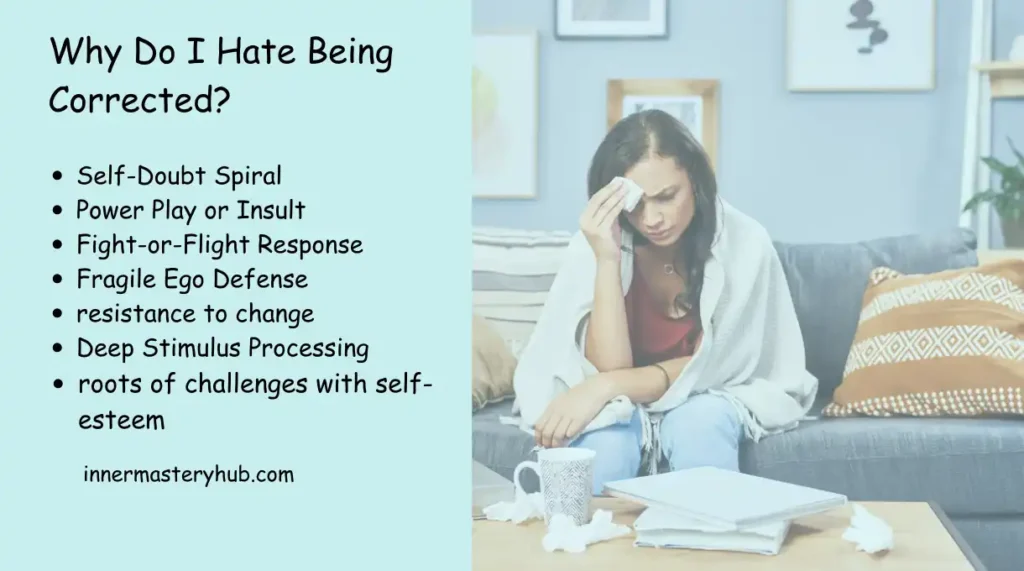
Have you ever had an argument where someone pointed out a small mistake you made, and you were suddenly upset? For instance, “Why do I hate being corrected so much?” We’ve all experienced it at some point, whether it’s a partner reminding you of that one detail you missed or a coworker correcting your facts at a meeting. This article digs deep into the “I hate being corrected” mentality.
Why does “I Hate Being Corrected” feel like a struggle
Let’s begin with the fundamentals. The problem is simple but substantial: many of us hate being corrected. It’s not only about the adjustment; it’s also about the emotional impact. There are underlying causes connected to our brains, upbringing, and even evolution, which psychologists have been studying for years.
Studies have shown that this dislike might be caused by anything from early experiences to ego defense. Admitting flaws causes the brain regions associated with pain and conflict to become active, making it feel nearly physically painful.
21 unique reasons why people hate being corrected
These reasons are not merely arbitrary ideas; rather, they are derived from research on ego, trauma, cognitive processes, and psychological theories.
Embarrassment from Learned Shame. We often learn from an early age that making mistakes indicates that we are flawed. If our parents or professors used to make fun of us for mistakes, corrections now bring back that shame, which makes us feel vulnerable and unworthy.
Threat to Authority. Getting a correction may feel like it threatens your credibility if you hold a leadership position or are seen as an authority. According to psychologists, this damages your reputation for competence, particularly if it comes from someone “below” you.
Self-Doubt Spiral. When you receive a correction, your confidence in your own judgment is shaken. This may outcome in greater insecurity, when one minor fix causes you to doubt all you know, according to research on self-esteem.
Perceived Power Play or Insult. We may think the corrector is attempting to outdo us. According to social dominance theories, narcissistic characteristics in other people (or how we see them) make this seem like a purposeful attack.
Dissonance in cognition. When facts conflict with our thoughts, our brains hate it. Inner unrest results from this misalignment between the rational, emotional, and instinctual elements of the brain; it’s as if your entire reality is coming apart.
Trauma Response from Childhood. Corrections usually mirror strict parents or other authoritarian people from our background. The “authority imprint” triggers trauma modes, causing us to revisit helplessness.
Activation of the Fight-or-Flight Response. The nervous system shuts down (freeze), dismisses it (flight), argues back (fight), or agrees too much (fawn). It’s a survival strategy gone wrong in contemporary conversations.
Echoes of Shame and Betrayal. It evokes feelings of shame from our early years and feels, deep down, like a betrayal of trust. Experts in psychological trauma explain that even small corrections hurt so much because of this emotional memory.
brain misalignment. Our cognitive, emotional, and action-oriented brains are wired to align, but we experience brain misalignment as overwhelming. This is hating being corrected, which, according to evolutionary psychology, feels like a personality crisis.
Identity Threat. Owning up to our mistakes makes us question who we believe we are. A correction targets your fundamental identity if you consider yourself to be “the smart one,” which causes resistance.


resistance to change. Humans are resistant to change because it is difficult to rewire their early brain patterns. Veteran studies show how fixed configurations make it difficult to accept new realities.
Fragile Ego Defense. A fragile ego is unable to take an attack easily. We would prefer to ignore facts than address the emotional risk of being incorrect because we are psychologically fragile.
Self-Esteem Vulnerability. When someone has low or unstable self-esteem, corrections may come across as personal attacks. Studies connect this to skewed perceptions of reality through protective mechanisms.
Reality Distortion Mechanisms. We distort the truth to safeguard our mental health. This is a traditional psychological defensive tactic that spares you the agony of admission.
Deep Stimulus Processing (for HSPs). Extremely sensitive individuals process criticism very deeply, which increases the emotional impact because of increased limbic system activity.
Emotional Brain Overdrive. Revisions ignore reason in favor of a powerful emotional response that brings up irrelevant previous traumas.
Overcoming Shame Revival. Shame is exacerbated by the resurfacing of old memories of criticism. According to the HSP study, this results in a build-up of emotional strain.
Logic Bypass Effect. Reasonable dismissal is impossible in the moment because of the logic bypass effect, which causes the thinking brain to get sidelined.
Ego Bruising in Social Contexts. Corrections damage our egos because we want to be competent in groups, according to social psychology. It is similar to a status reversal.
Competence Maintenance Drive. Anything that challenges our abilities is hated by us. Self-reflection studies show that this gets worse due to narrow-mindedness.
roots of challenges with self-esteem. Corrections might create deeper insecurities due to ingrained uncertainties, which result in defensiveness that impedes progress.
These reasons show that “I hate being corrected” is a deeply rooted psychological trait rather than merely being petty. Modern research on brain alignment and Freud’s ego defenses provides strong proof. Here’s the thing, though: this issue isn’t limited to your thoughts.
Why Hating Being Corrected is Wrecking Your Life More Than You Think
Let’s shake things up a bit now, since if you ignore the reasons behind your hate being corrected, it might have very negative consequences. Imagine being corrected in front of the team by a coworker while you’re at work. You shut down or lash out instead of learning.
Relationship barriers are created over time, professional advancement suffers, and even mental wellness is compromised. Psychologists note that becoming defensive about ego threats for an extended period of time can cause people to stop giving you feedback, which can result in isolation.
According to a study on owning up to mistakes, perfectionists who detest criticism often have issues with their self-esteem, which raises their risk of anxiety and sadness. Consider relationships. “I hate being corrected” weakens trust if it causes you to dispute with your partner every time they point something out.
According to social psychology research, defensive responses weaken relationships and escalate small arguments into larger disputes. This is intensified for very sensitive people, who may shun meaningful connections or experience people-pleasing tiredness as a result of criticism that seems like a tsunami. And in work environments? Teams suppress ideas to avoid conflict, and bosses who are unable to handle corrections miss out on potential for creativity.
This resistance prevents growth on a personal level. According to evolutionary psychology, inflexible brain alignments limit adaptation and leave you stuck in outdated ideas. Responses to childhood trauma? They never stop shooting, making every adjustment a battleground, raising stress levels, and putting themselves at risk of burnout.
Psychologists attribute narcissistic behaviors and even cognitive impairment over time to reality denial, which is a result of fragile egos. It’s not just annoying; it’s an endless cycle that isolates you, limits your potential, and harms your health. This is for you if you’ve ever questioned why little things become so out of control and had a knot in your stomach. There is a way out, though, so don’t worry.
Practical Ways to Stop Hating Being Corrected and Turn It Into Growth
You can rewire this “I hate being corrected” reaction. Psychology offers tools to build resilience, starting with self-awareness. Here’s how to tackle it, step by step, with evidence-based strategies.
This “I hate being corrected” response can be rewired. The first step in developing resilience is self-awareness, which psychology provides. Here’s a step-by-step guide to using evidence-based techniques to address it.
Reframe corrections as gifts first. Change your perspective from one of attacks to one of possibilities. Techniques from cognitive behavioral therapy (CBT) assist by reframing thoughts such as “This means I’m stupid” into “This helps me improve.” Do this every day. “Thanks for the insight.” Pause when corrected.
Second, use mindfulness to overcome childhood imprints. Meditation and other trauma-informed techniques help reduce fight-or-flight reactions. Shame triggers are reduced by apps like Headspace, which teach you to notice emotions without responding.
Third, use self-compassion to strengthen your sense of self-worth. According to Kristin Neff’s research, being polite to oneself when you make errors increases your sense of self-worth and lessens the threat of correction. affirmations to write in your journal, such as “I’m worthy even when wrong.”
Fourth, use your rational faculties. Deep breathing and other neocortical activation strategies help HSPs evaluate criticism logically before emotions take over.
Fifth, actively ask for feedback. According to social psychology, accepting corrections builds social capital and tolerance. Begin by asking yourself, “What could I improve here?”
Get treatment if trauma runs deep, surround oneself with supportive correctors, and learn from mistakes early (according to adaptation research). You will eventually learn to accept errors instead of hating them. Keep in mind that growth happens outside of comfort zones.
To sum up, the first step is to understand why “I hate being corrected”. These 21 explanations and fixes can help you deal with it more effectively. Which of the following reasons appeals to you? Let’s continue the discourse by leaving a comment.
FAQs for “I Hate Being Corrected”
Why do I hate being corrected so much?
Being told off can be unpleasant because it can bring up memories of criticism from childhood, feelings of guilt, or threats to one’s ego. It becomes an attack as your brain’s fight-or-flight reaction takes over. To lessen the pain, reframe corrections as teaching moments.
Is it normal to hate being corrected?
According to studies, most people get defensive when corrections trigger brain regions associated with pain and conflict. It is connected to identity and self-worth. To reduce your sense of threat, cultivate self-compassion.
How can I stop hating being corrected?
To start, take a deep breath to activate your rational brain before responding. Reframe adjustments as development rather than attacks by using cognitive behavioral therapy. Resilience is increased by writing affirmations in a journal, such as “Mistakes teach me.”
Why do I get defensive when corrected?
When your ego defends itself or old trauma resurfaces, you become defensive. According to social psychology, we are afraid of appearing inadequate. To end the cycle, try accepting the correction in a composed manner.
Does hating being corrected mean I have low self-esteem?
It can, but not always. Correction aversion has been linked in studies to low self-esteem, where errors are perceived as personal failures. Seek feedback proactively and cultivate self-compassion to boost your confidence.
Why does being corrected feel like a personal attack?
In the event that you are really sensitive, your brain may perceive corrections as challenges to your identity or proficiency. Logic is evaded by emotional brain overload. Calm processing can be facilitated by mindfulness.
How do I handle being corrected at work?
If you’re extremely sensitive, your brain could perceive corrections as challenges to your identity or skill. Logic is circumvented by emotional brain activity. You can process more calmly if you practice mindfulness.
Can childhood experiences make me hate being corrected?
Receiving severe criticism from parents or instructors might indeed leave a “shame imprint.” Corrections now bring back those memories. One way to rewire these trauma responses is through mindfulness or therapy.
Why do I feel embarrassed when corrected?
Embarrassment is linked to evolutionary psychology-based social anxieties about losing status. In gatherings, your brain tries to remain competent. Reframe errors as commonplace to lessen embarrassment.
How can I learn to accept corrections gracefully?
Saying “Thanks for pointing that out” and reflecting before answering are examples of active listening. Research indicates that getting feedback increases tolerance. Corrective actions will eventually seem like opportunities for improvement rather than dangers.









